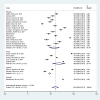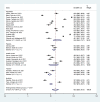Covid-19 Vaccine Acceptance and Determinant Factors among General Public in East Africa: A Systematic Review and Meta-Analysis
- PMID: 35720257
- PMCID: PMC9201368
- DOI: 10.1177/23333928221106269
Covid-19 Vaccine Acceptance and Determinant Factors among General Public in East Africa: A Systematic Review and Meta-Analysis
Abstract
Background: Vaccines are an effective and ideal solution that can reduce the burden of disease worldwide. Although vaccines are the most effective way to prevent infectious diseases. Anti-vaccine conspiracy theories impair vaccination acceptance intentions. Several studies were conducted in East Africa. However, these studies had reported inconsistent findings. Therefore, this systematic review aimed to pool the prevalence of COVID-19 vaccine acceptance and identify its determinants.
Methods: PubMed, Google Scholar, and GLOBAL HEALTH databases were used to retrieve previously published studies. All papers published in the English language up to February 28, 2022 were included. The result was written and reported according to the PRISMA updated guideline. A random-effect model was used to estimate the pooled prevalence and effect sizes. Heterogeneity was assessed using I2 test statistics. Publication bias was assessed using funnel plot and egger's test statistics. Statistical tests result at P-value<0.05 were declared as having significance.Result: A total of 25 Cross-sectional studies with a total sample size of 33,044 were included in this study. The pooled prevalence of Covid-19 vaccine acceptance was 60.2%, (95%CI: 52.8- 67.3). Egger's test statistics (P = 0.003) showed there is a significant publication bias. Attending above secondary school (AOR: 2.1, 95%CI: 1.37, 2.96), having good knowledge about the vaccine (AOR: 2.1, 95%CI: 1.6, 2.8), having a positive attitude towards vaccine (AOR: 3.8, 95%CI: 2.3, 6.2), history of COVID-19 infection (AOR: 2.7, 95%CI: 1.6, 4.7) and being male (AOR: 1.8, 95%CI: 1.2, 2.7) were found to have a significant association with COVID-19 vaccine acceptance.
Conclusion: The COVID-19 vaccination acceptance rate was good, but it could be improved. The findings could help governments to figure out the best way to carry out COVID-19 mass vaccination campaigns. There is a lack of data in most countries. Therefore, we suggest more studies be conducted in the future.
Keywords: COVID-19 vaccine; vaccine acceptance; vaccine acceptance determinants.
© The Author(s) 2022.
Conflict of interest statement
Declaration of Conflicting Interests: The author(s) declared no potential conflicts of interest with respect to the research, authorship, and/or publication of this article.
Figures







References
-
- WHO. WHO Director-General's opening remarks at the media briefing on COVID-19–11 March 2020. Updated 11 March 2020. Accessed Feburary 1, 2022. https://www.who.int/director-general/speeches/detail/who-director-genera....
-
- PAHO. WHO declares Public Health Emergency on novel coronavirus. Updated 30 Jan 2020. Accessed Feburary 1, 2022. https://www.paho.org/en/news/30-1-2020-who-declares-public-health-emerge....
-
- WHO. WHO Coronavirus (COVID-19) Dashboard Accessed January 10, 2022. https://covid19.who.int/.
-
- WHO. WHO Coronavirus (COVID-19) Dashboard. Accessed January 10, 2022. https://covid19.who.int/region/afro/country/et.
-
- Baye K. COVID-19 prevention measures in Ethiopia: Current realities and prospects. International Food Policy Research Institute (IFPRI). 2020;(ESSP Working Paper 141).
Publication types
LinkOut - more resources
Full Text Sources

